To become a successful blogger, you need a niche—one that makes you money.
In this post, I will show you exactly how to find a niche for your blog. Furthermore, I will talk about how to write posts that actually rank and bring in traffic.
Let’s jump into it!
How to Pick a Niche That Works?
To pick the right niche for your blog, you need to do research and careful thinking.
The niche can make or break your blog.
Not all niches are created equal. Some niches do 100 times better than others.
In this section, you will learn how to identify your interests, and expertise, conduct market research, and assess your competition.
After reading this part, you’ll have a solid understanding of what it takes to choose a niche that aligns with your passions and goals while also appealing to a sizable audience.
1. Don’t Pick a Broad Niche
A great example of a too-broad niche is something like “Hotels” or “Fitness” etc.

If you have a blog in these niches, you’re competing against a ton of big players that have 20-year-old websites and millions of visitors, and strong standing with Google.
I’m not saying you cannot eventually outrank these sites, but it takes years of exponentially growing your blogging business.
In some cases, that might just be impossible, unless you scale your business to outperform the competing sites’ content creation pipelines.
Imagine you have a fitness site where you publish 1 blog post a day. Then one of your competitors publishes 10-50 fitness blog posts every day.
How could you ever outperform one of these sites?
This is why it’s important to choose a niche that’s not too crowded.
2. Don’t Go for Too Small a Niche
Even though you should narrow down from those big niches, you still need to make sure there are people interested in your sub-niche.
One way to do this is by choosing a niche and seeing if there are at least some blogs in the space. If not, that might be an issue too.
Simply put, if there’s no competition in your niche, it might mean:
- There’s no money to be made (even if it had an audience)
- There’s nobody interested in the topic at all
Also, a too-narrow niche might mean you run out of blog post topics quickly.
Your goal is to write hundreds of niche-specific blog posts. If your niche only allows you to write a handful of stories, then that might be an issue.
Start Small, Scale Up
To take home, you need to start with a small niche or sub-niche and scale it up.
By picking a less competitive niche, you get the ball rolling.
When you rank high on search engines for less competitive search terms, you build trust in the eyes of search engines. Later down the line, they can start ranking your content for more competitive keywords.
Your first blog posts need to be very niche-specific and something that very few authors have written about.
For example, if you’re in the dating niche, your first blog post could be something like “How to Start a Conversation on Tinder with a Girl without Bio“.
This is an example of a “niche enough” topic. It’s a very specific question that has some search volume but is not one of those highly competitive terms.

By starting small, you grow strong in the narrow niche in the eyes of Google. Later on, you can rank for something more competitive as you build trust and authoritativeness.
Your 500th blog post could be something like “Best Dating Apps for College Students” etc. This kind of search has way more search volume than the previous example.
Speaking of search volumes, you can use Google’s suggestions to see if a search has volume.
If you type something into Google, the suggestions are search terms people are actually searching for.
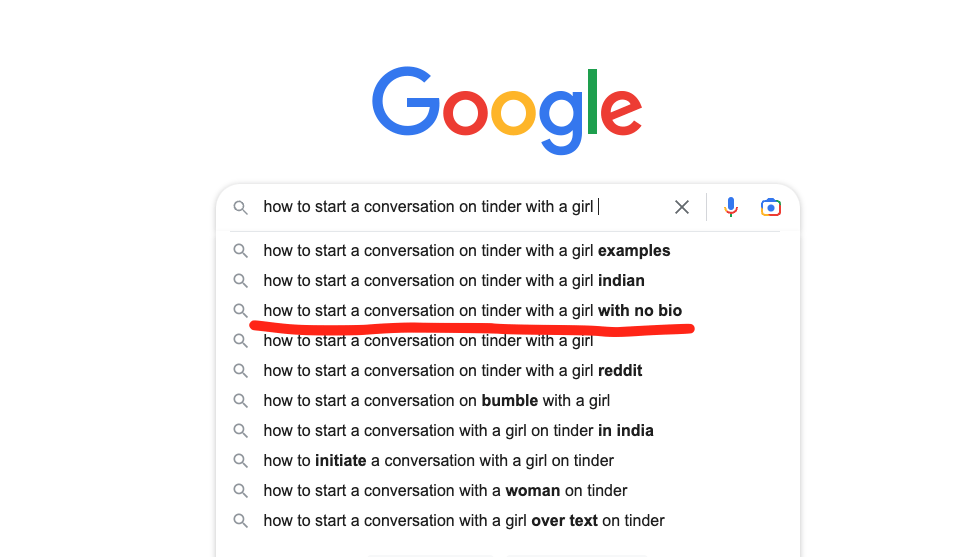
Brainstorm Niche Ideas
In an ideal world, your blog’s niche should be something that:
- You’re passionate about
- You have expertise in
- Has a big audience
- Has no competition
- Has tons of money to be made
Unfortunately, finding a niche that fills in even 2 of the 5 criteria above is hard.
In the real world, you will probably find a niche that:
- You have some interest in
- You have little to no expertise in
- Has a decently-sized audience
- Has noticeable competition
- Is decently monetizable
This is totally fine. You don’t need to be an expert or a professional in your niche. As long as you find something interesting that is monetizable and not too competitive, you’re good to go.
To help find a good niche for your blog, let’s do some brainstorming.
#1 What Are Your Favorite Topics?
Think about your favorite topics. Is there some topic you’d be interested in?
One of the best starting points for picking a niche is choosing something you like and truly care about.
Nothing is worse than jumping in on a niche you don’t care about.
To build a successful blog, you need to provide value to your audience. In other words, you need to make the space better. If you have no interest in a niche, it’s hard to provide value and try to solve problems for the people in the space.
You can surely make a blog work even if you don’t care about the niche, but it’s much harder both mentally and content creation-wise.
#2 What Books and Blogs Do You Read?

One way to think of a potential niche is by considering what blogs and books you read.
If you spend time reading those, you’re probably interested in the niche as well, aren’t you?
Think about writing about these niches.
Also, is there some information that’s missing/unclear in the blogs you read? If that’s the case, it might be a good idea to jump in!
#3 List Your Jobs, Hobbies, and Experiences
In my opinion, one of the best ways to consider a niche is by listing down your hobbies and jobs.
The job/hobby you have is probably something millions of other people have as well.
You could start your blog that targets beginners in the job/hobby you occupy. The best part about this is that beginners are the biggest group of people. Also, it’s easy to write about the basics of something.
Of course, you can’t blindly choose a niche even if you’re good at it. This is because it still might be too competitive. You still need to do the research and validation before locking the niche.
My coding passion turned into a coding blog. The problem was that the blog needed tons of visitors before it could be monetized.
Unlike one might believe, coding is a pretty bad niche for a blog. This is because 99% of the visitors have no buying intent. You need like 200k+ monthly visitors to earn decently.
So even if you have a passion/expertise, don’t blindly choose that as the topic before doing research and validation.
#4 What Have You Accomplished?

Accomplishments are closely related to the previous point of jobs/hobbies/interests.
There are many accomplishments you might have that can be worth writing about. You’d be surprised how many people are interested in learning about your journey to success.
Here are some accomplishments one might have:
- Losing weight: If you lost weight, you could start a blog to share your weight loss journey to help others struggling.
- Running a marathon (or completing a fitness challenge): Start a blog to share your training and preparation strategies, race day experience, and post-event recovery tips.
- Building a successful business: There are tons of entrepreneurial people in the world. If you happen to have built a successful business (or are part of one), it’s worth writing about!
- Traveling to many countries: Do you travel a lot? People are always interested in real-life experiences from countries across the globe. If you travel to a place, you can share tips and recommendations about the country.
By sharing your journey to accomplishments, you can create valuable content that resonates with your readers and builds a loyal audience over time.
Questions You Need to Answer
Before jumping in on a niche, you need to do some validation. First, it’s important to answer to learn the answers to these questions. Missing one of these can negatively impact your success as a blogger.
1. Will You Want to Write About This After 100 Posts?
Becoming a successful blogger is not only about choosing a good niche. It’s also a lot about how sure you are you want to actually write about that niche.
Remember, it will take at least 50-100 blog posts before you start seeing success with your blog.
Make sure you choose a niche in which you want to work for the next months or even years to come. Ask yourself “Do I really want to write about this niche for the next 100 posts?”
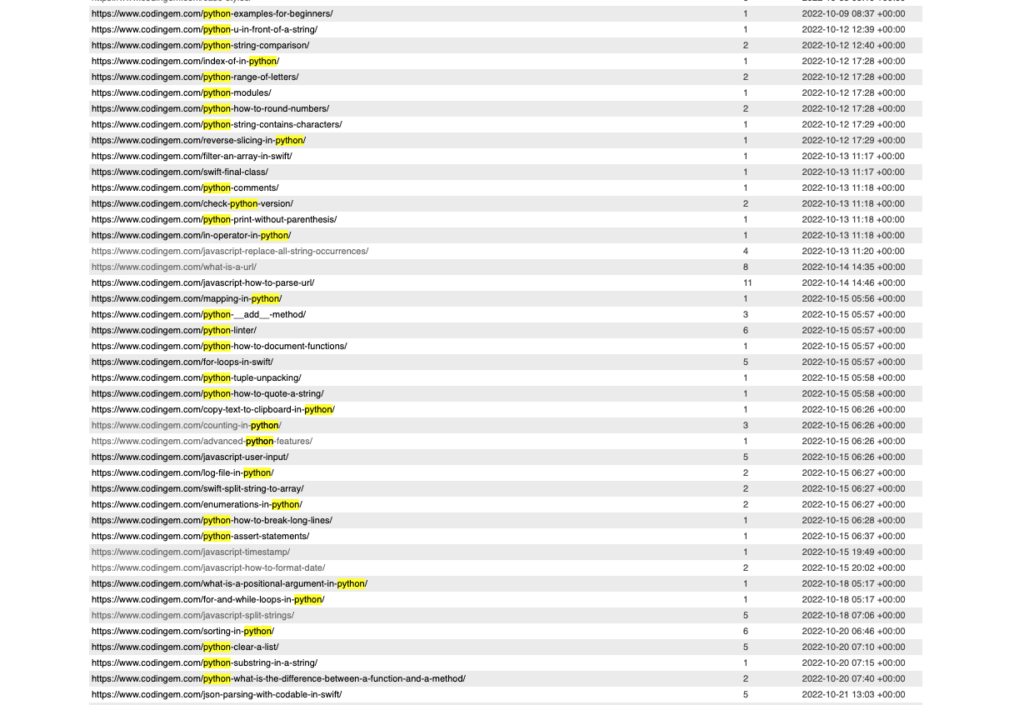
I started a blog about coding—a hobby/job I had had for 5+ years.
I ended up writing 350+ programming blog posts before I hit 500,000 monthly visits and a $10,000 monthly for the first time. This took about 1.5 years.
2. Do You Know About This Niche?
You don’t need to be an expert in the niche you jump in. If you’re not, don’t pretend to be one. Be prepared to spend more time on research and groundwork.
If you are familiar with the topic, you might be able to easily write 2-3 times faster than if you’re a newcomer.
It’s perfectly fine to jump into a niche you’re not familiar with. Beginner blogs are effective because a beginner who teaches other beginners can relate to the beginners’ struggles. Just remember to put in the time!
If you are familiar with the niche you’re writing about, you have a clear advantage when it comes to producing content quicker. However, this by no means guarantees your success as a blogger!
Also, I must warn you about using AI in writing content. It’s best to use AI as an assistant. If you rely on AI, it’s going to backfire quickly. AI makes mistakes that are hard to spot. If you’re not familiar with the topic you’re writing about, I recommend not using AI at all!
3. Does the Niche Make Money?
Even though it’s way too early to implement any monetization strategies in the first couple of months, it’s crucial to validate your niche.
The best way to do this is by jumping into the space and looking around. Are there affiliate programs in your niche?
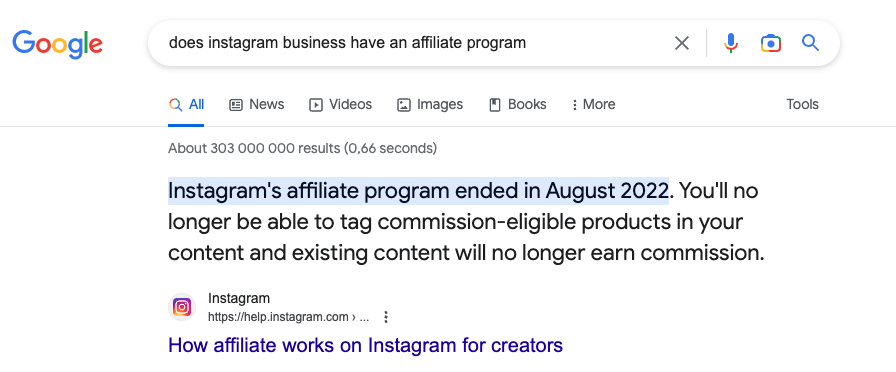
Obviously, the best way to do this research is by searching on Google. If you find a bunch of affiliate programs, that’s a good sign. Of course, your niche might be too competitive to jump in, but at least this step validates that there’s money to be made in the niche.
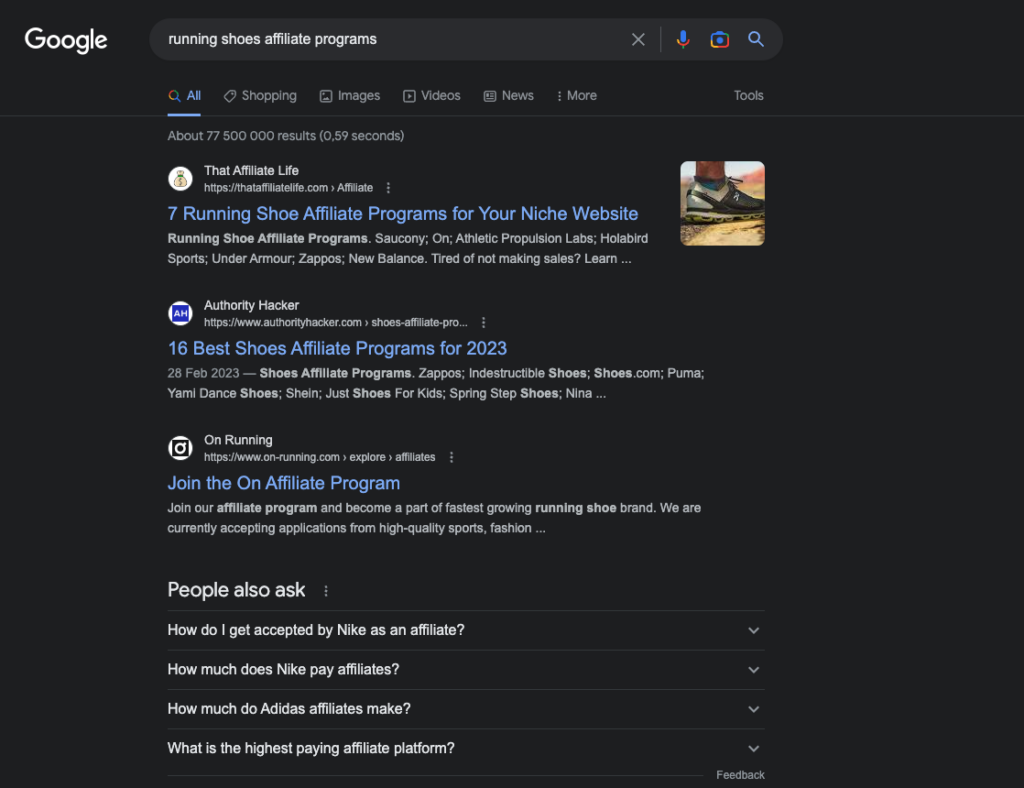
Another great way to check if there’s money to be made is by checking what others are doing.
Use Google to search for something that’s relevant to your niche.
Try to spot affiliate links in the results. Pay attention if the site shows ads or sells products/merch. By looking at what others are doing, you can get an idea of what’s (likely) working in the niche.
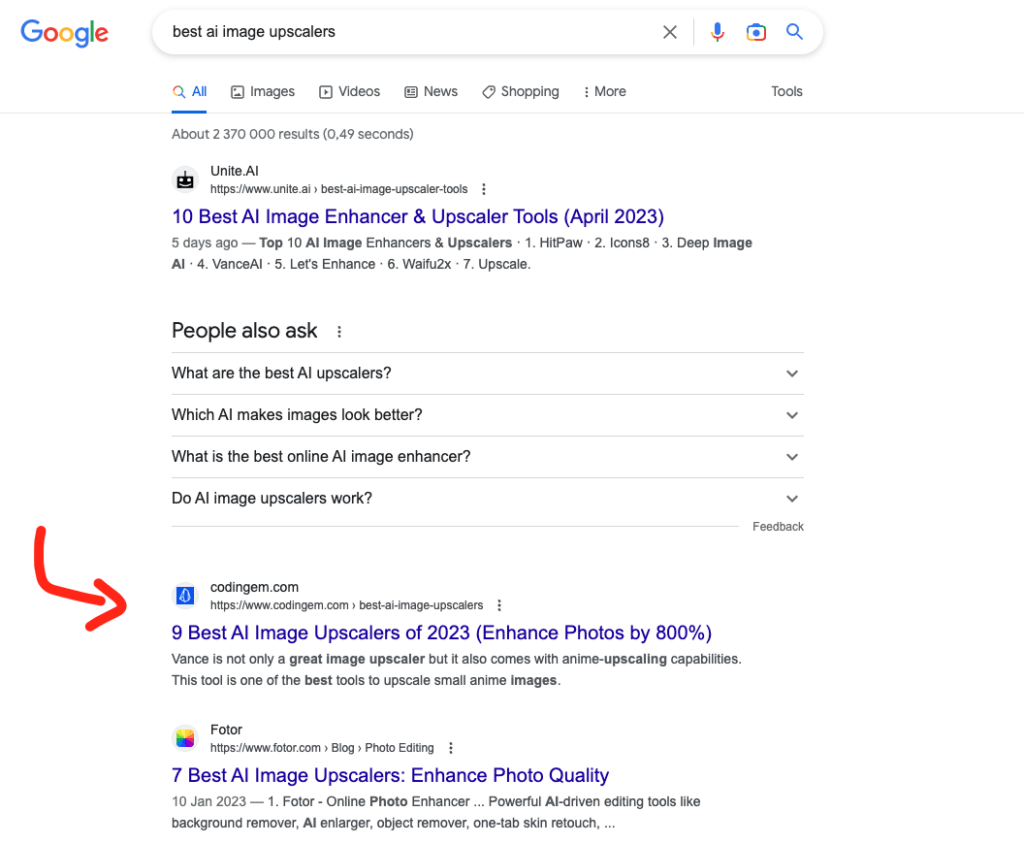
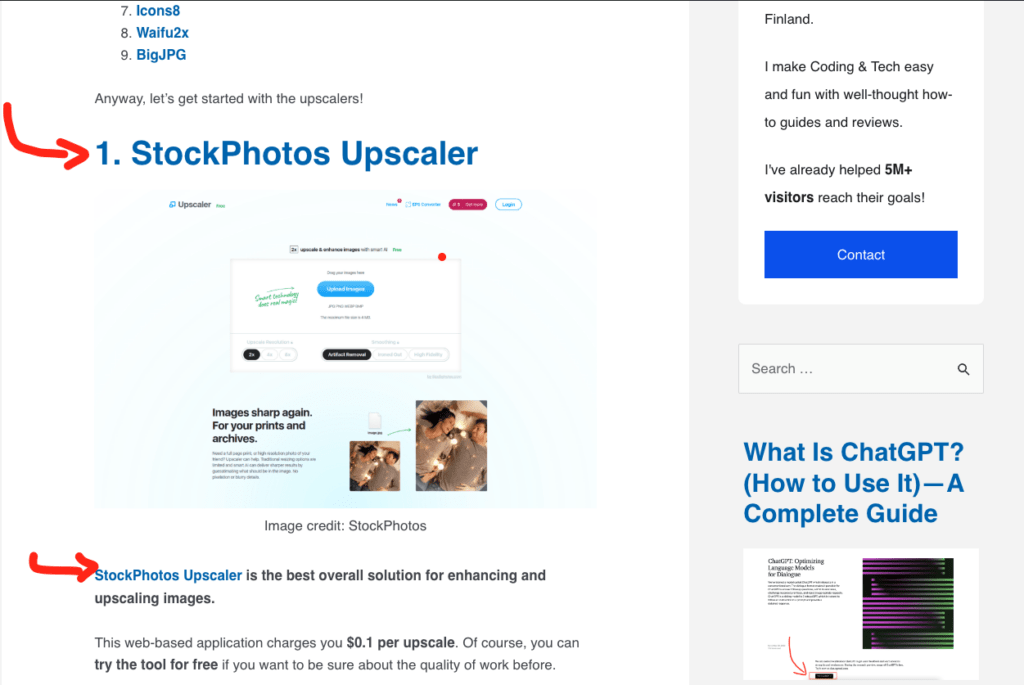
The above site clearly has affiliate links, no ads, and not any aggressive promotion. This suggests you can probably rank a similar piece of content and make some nice income with it.
As a matter of fact, the above site happens to be mine. This very piece makes about $50-$200 per month from affiliate sales.
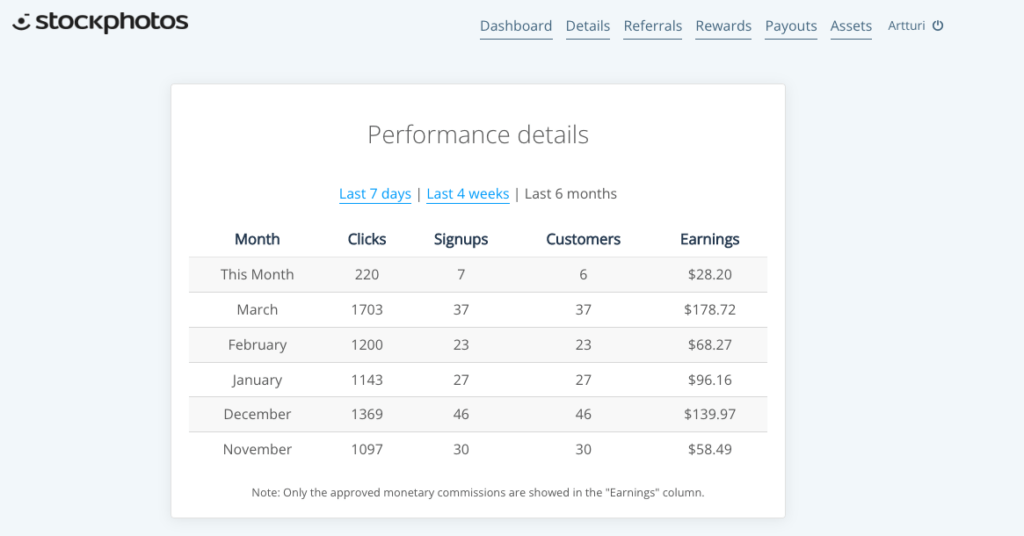
You see how useful it can be to check what others are doing?
I’m not saying you should always copy what your competitors are doing. But it’s easy to start with something someone else has validated. Later down the line, you can invent better solutions yourself.
4. What’s the Search Volume?
Unfortunately, there’s no way to know the exact search volume a topic has.
The only thing you can do is estimate.
Open up Google Trends and search for your niche or some topics in it.
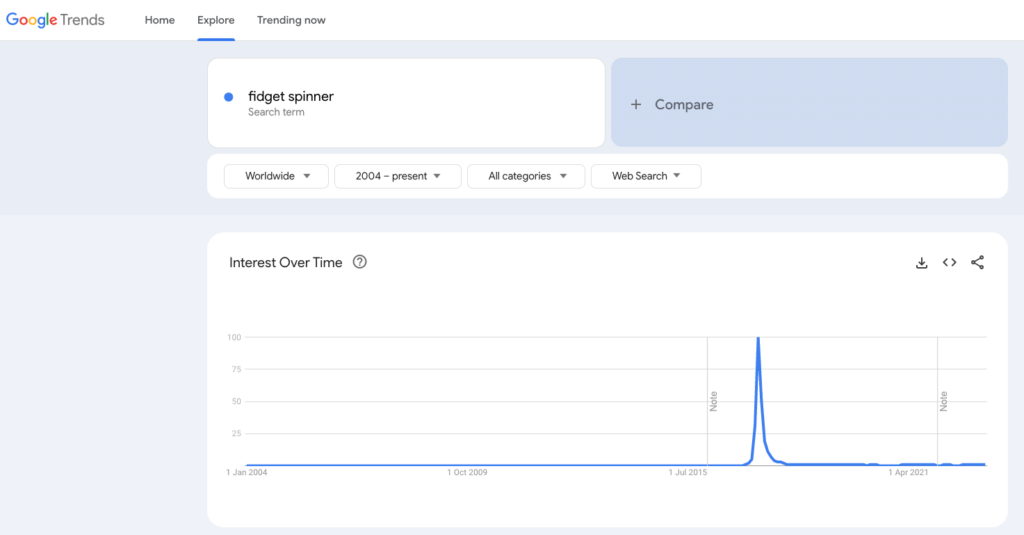
From Trends, you can see if there’s at least some search volume for a topic or niche.
However, Trends doesn’t show the number of searches. Instead, it only shows percentages with respect to the maximum search.
Can you guess why there’s a spike every year for this particular search term? 😉
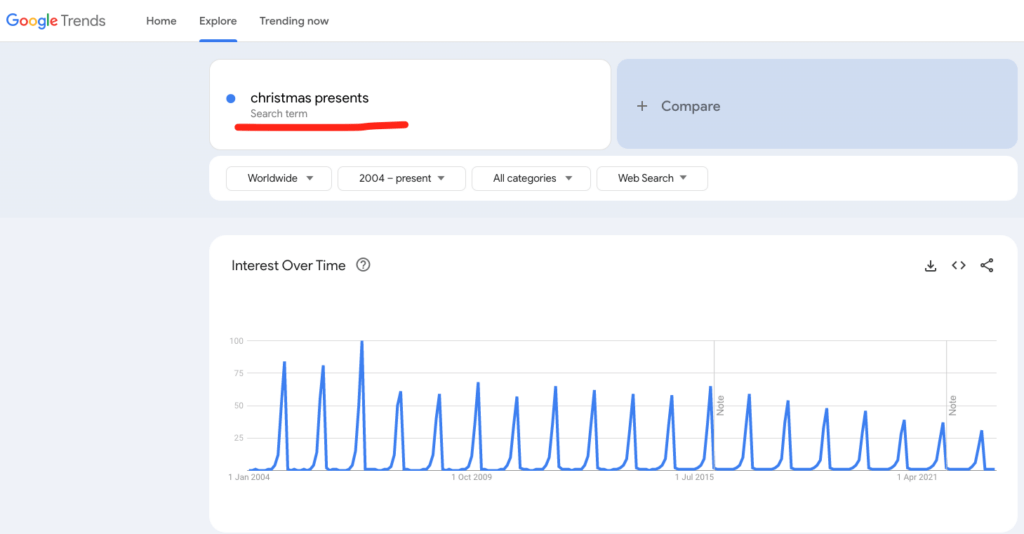
Instead of using Trends to know the number of searches, it’s helpful for figuring out the trends that take place. It’s not meant to give you exact search volumes but just an idea of what’s going on.
Notice that if the search volume is roughly less than 1,000 hits per month, then Google might not show any data! So even if some particular search says “There’s not enough data”, it doesn’t mean people wouldn’t search for it.
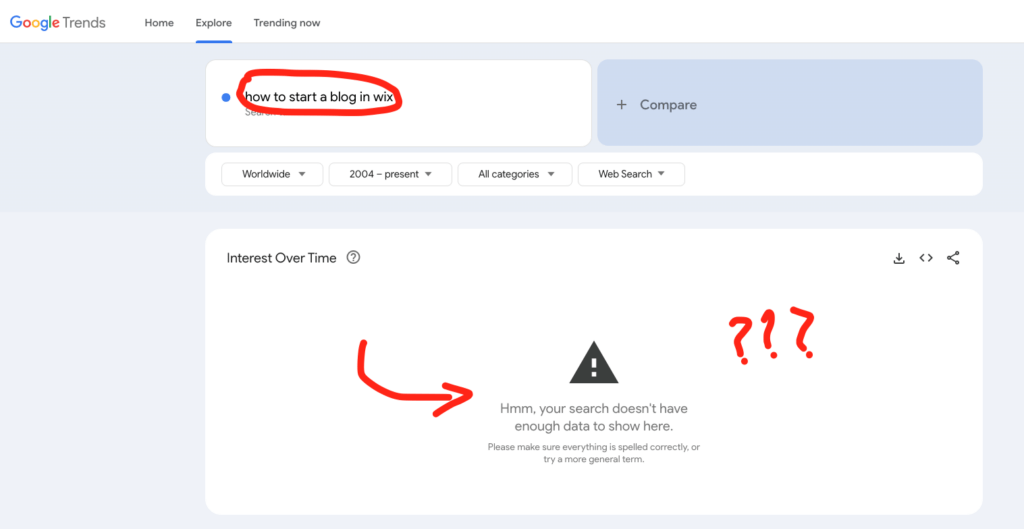
So it’s not the best idea to use Trends to validate demand. As a beginner blogger, you need to write about very niche topics—something that usually shows no search volume in Trends.
5. Is Your Niche Evergreen?
Another thing to keep in mind when choosing a niche for your blog is that the niche should be evergreen. In other words, it should be relevant for the years to come.
Once again, you can use Google Trends to see how a particular search term or niche is doing.
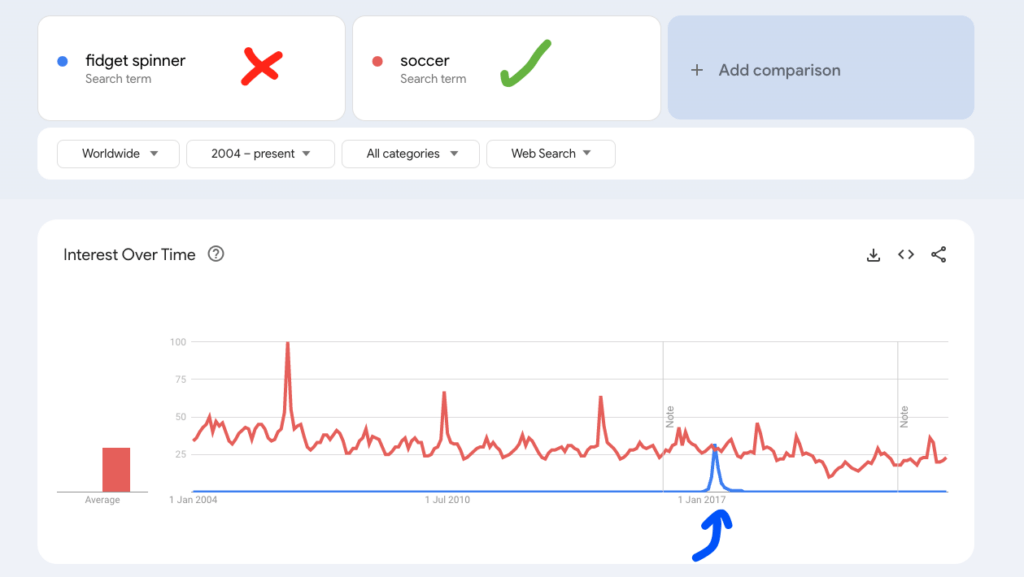
For example, soccer seems to be doing well and has done so for the past 20 years almost. On the other hand, a fidget spinner was a short phenomenon that lasted less than a year.
When you use Trends to see how your niche is doing, make sure it’s stable or rising up. You need to think twice when choosing a niche that’s trending down.
In an ideal world, your niche looks something like this:
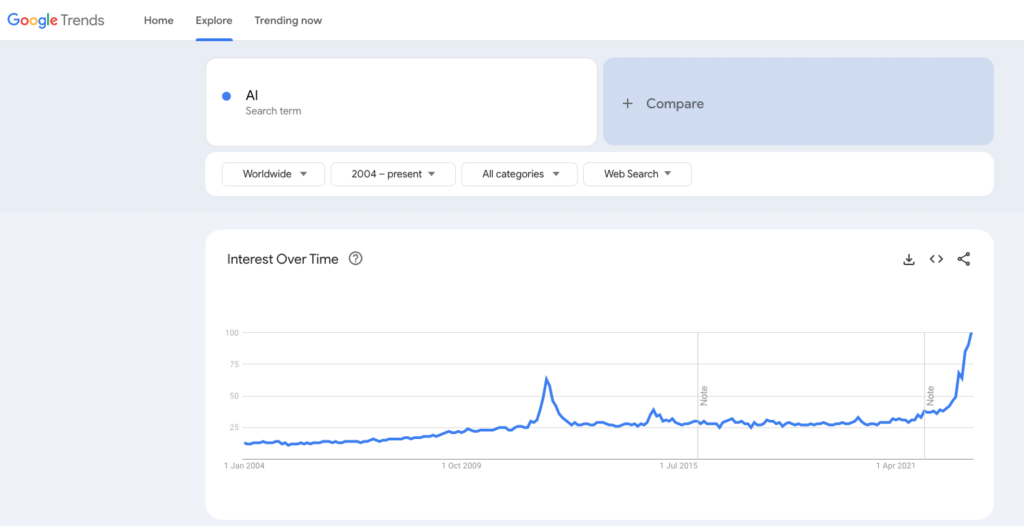
An exponentially growing niche is great. There are new things to write about and relatively little competition. On the other hand, a slowly fading niche is usually crowded and becomes irrelevant over time.
Of course, almost no niche looks like the screenshot above. AI is an exception. But at least make sure the niche isn’t completely dying down.
To take home, choose an evergreen niche. If you’re able to rank high in an evergreen niche, you might bring in traffic for years to come—with no extra work. This is the main goal of blogging. To build an audience that comes organically without promotion.
6. Is There Too Much Competition?
Avoid too crowded niches. It’s wise to narrow your niche down until there’s not too much competition but still an audience.
Make sure to read my post: What Niches to Avoid as a Blogger!
Use search engines to look up the top blogs in your niche. Check out their content, their social media presence, and their overall online visibility. This can help you understand the level of competition you’ll be facing.
Also, analyze the search results for terms relevant to your niche.
Are there big and venerable companies that rank in the top 10 search results? If so, there might be very slim chances for a new blog to outrank those.
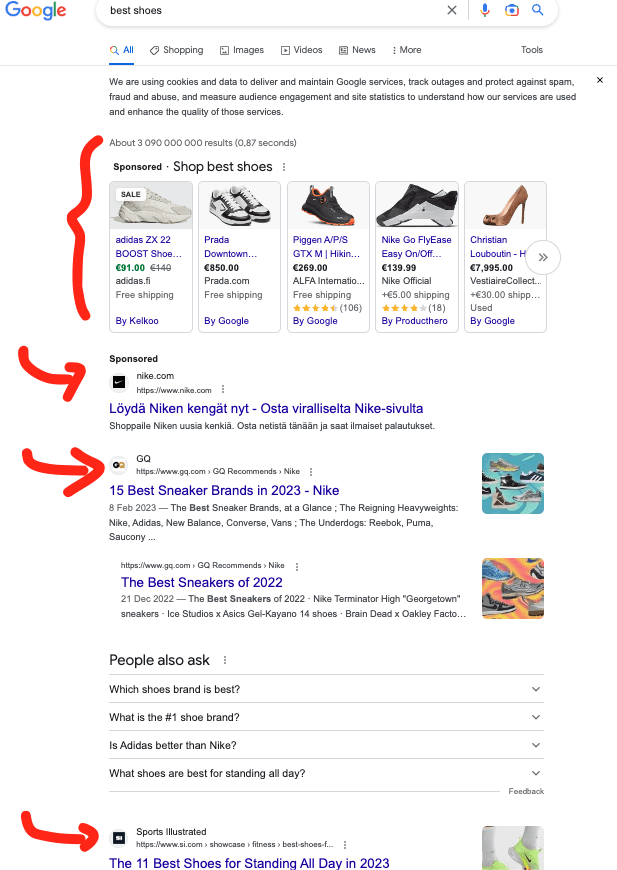
Based on the above search, “Best shoes” is clearly a too competitive topic. So if your niche was “Fashion” or “Sports”, writing about shoes, in general, wouldn’t make much sense.
The top results are either ads, Google featured boxes or notable sites like gq.com or si.com. I’m not saying you cannot outrank these competitors, but you’d probably need to build a strong brand as they’ve done before.
By the way, if you want to check how many blog posts/web pages target your search term, you can use the “allintitle:” operator. This filters out all the pages from search results except for the ones that have the words followed by allintitle: in them.

For example, “best shoes for kids” appears in about 28,000 search results. This is a really competitive topic.
When I validate a niche, I want to make sure there are monetizable blog post topics with under 1,000 search results.
The cool thing is you can almost always narrow it down.
For example, if your initial niche was “Sports”, you’re biting way more than you can chew. But if you narrow it down to “Tennis” or “Tennis for Kids”, you probably have a much better chance of ranking high.
For example, I chose my first blogging niche by narrowing it down like this:
Education -> Programming -> Python Programming -> Python Programming for Beginners
7. Is There Too Little Competition?
Don’t pick a too narrow niche either!
You can rank high for a nonexistent niche. But that’s not much of a use because nobody is reading your blog posts.
Say your niche is “cats with two legs”. Here’s what the Google Trends chart looks like:
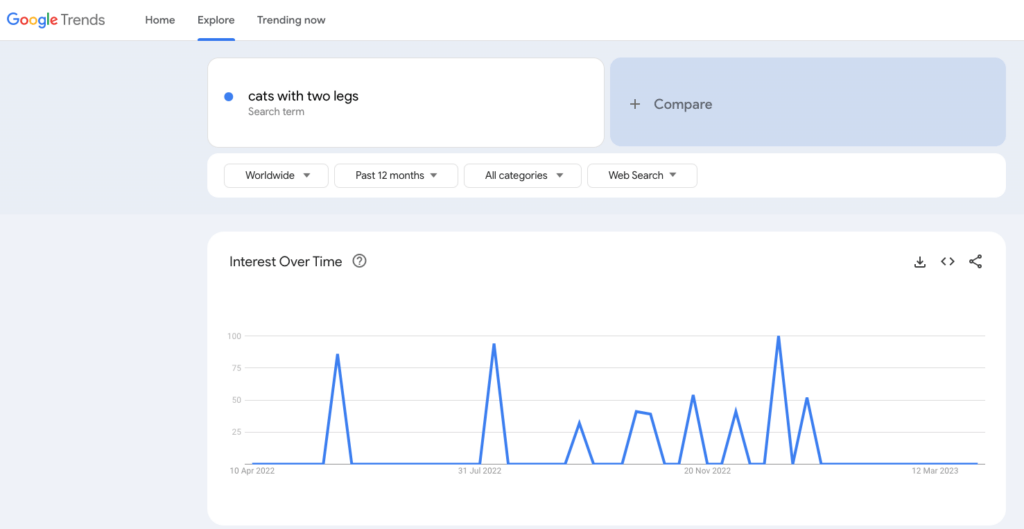
Clearly, there’s little to no search volume for cats with two legs—even though there are dozens of owners across the globe.
Let’s say there are 10,000 owners of a cat with two legs in the world. If you were able to reach 10% of those every month, you’d get 1,000 visitors. When it comes to monetization, this means $10-$100 in revenue if you do things right.
This niche is clearly too narrow to find financial success.
Try to find the right balance in your niche. Go for something that has competition and search volume but that’s not too competitive.
Tip: Try to find other one-person blogs in your niche. If you see those ranking high on search engines, it indicates you have chances too! But if there are only those authority sites, that might be a red flag as well.
8. Do You Want to Make This Space Better?
When you choose a niche for your blog, it’s important you care about the niche.
Do you really want to help people in that niche?
As a blog owner, you’re a business person that solves problems and provides value. You’re not just a writer that writes content.
If you go money first, you’ll probably burn out before you get your first 100 visitors to the site.
When you choose a niche you truly care about, you’ll find:
- Motivation. It’s easier to stay motivated and inspired to create new content around topics you care about. This can help you stay consistent with your blogging efforts and build a loyal audience.
- Authenticity. When you’re writing about something you truly care about, it’s easier to be authentic and genuine. This builds trust with your audience and establishes yourself as an authority in your niche.
- Will to engage. When you care, you’re more likely to be interested in engaging with your audience and helping them with their questions and concerns. This can help you build a strong community around your blog and establish yourself as a thought leader in your niche.
- Fulfillment. Blogging should be a fulfilling and enjoyable experience. When you’re blogging about something you’re passionate about and helping others in the process, you’re more likely to feel fulfilled and satisfied with your work.
But as much as I’d like to say that money is a byproduct of writing about passions, that’s not the case either. You need to make sure your niche is monetizable beforehand.
There are some niches that make no money no matter how passionate you are about them!
Also, if you own an entrepreneurial mindset, the niche might not matter that much—it’s the process that’s your passion.

Do you not care about the niche as long as you can help people?
Do you want to dive deeper into something you never thought of?
If this sounds familiar to you, then choose the most lucrative niche possible. If it’s the process that intrigues you, the niche won’t matter that much—as long as it helps you financially.
Niches to Stay Away From
Avoid YMYL niches.

YMYL stands for “Your Money or Your Life”.
YMYL refers to niche sites that provide information that could significantly affect a user’s well-being, happiness, health, financial stability, or safety.
Such niches are considered to be highly important. This is why Google places greater emphasis on the quality and reliability of the information provided by these blogs.
Examples of YMYL niches include:
- Financial information or advice, such as investing, taxes, retirement planning, and insurance.
- Medical or health information, including information about specific diseases, medical treatments, and mental health.
- Legal information, such as information on criminal law, divorce, child custody, and immigration.
- News and current events, especially those that could have a significant impact on society, such as political news or news related to natural disasters or pandemics.
- Shopping or e-commerce sites that deal with high-value products, such as real estate, cars, or electronics.
Google’s ranking algorithm takes into account the YMYL nature of a website and applies stricter standards for quality and accuracy.
Therefore, if you operate a website in a YMYL niche, it is essential to provide high-quality, reliable, and accurate information to your users. Preferably, you should be an expert in the niche (or produce the content with someone who is).
In other words, it’s just easier to not go YMYL with your first blog, at least.
Validation Phase
Once you have chosen a niche, it’s time to validate it by taking some actions.

To put it short, you will test the waters by writing some posts about that niche. You might want to start a blog or try a platform like Medium.com at this stage.
#1 Write Down Blog Post Ideas
Instead of spending time coming up with topics by yourself, use search data instead.
As I stated earlier, it’s important to write about topics that people are searching for. This is because, at the end of the day, you are here to solve their problems.
To find blog post topics, use Google’s own data.
Step 1: Open up Google Search (preferably in a mode where your history doesn’t affect the suggestions). I use Incognito Mode to do this.
Step 2: Type something related to your niche. For example,” [your niche] how to “.

Step 3: Look at the search suggestions. These are actual searches people are constantly making. These are good topics for blog posts.
Step 4: Check the competition. Google the topic and see what the space looks like. Use the “allintitle:” operator to check how many competing pages exist. Even if you’ve chosen a narrow niche, the main topics might be too competitive to write about.
Step 5: Choose a handful of low-competition long-tail topics in your niche.
Tip: When validating blog post topic ideas, make sure you mainly see blog posts in search results. If there are videos or images only on the results, a blog post is not a great fit for that search!
#2 Write a Handful of Posts
The next main step in validating your niche is writing blog posts about it.
In the previous step, you came up with some blog post topics in your niche. Now it’s time to write about those topics to see if you’re actually into this at all!
Now, don’t get too comfortable. It’s crucial to write the best post about your topic on the entire internet. Otherwise, your content is not going to rank high.
Search engines are products that only suggest the best resources for the searchers. If your article is not the best, it’s not going to rank high.
Write the most detailed long-form post about that topic.
To get an idea of the competition, open up all the top 10 search results for your topic. Make sure to write a piece that’s longer and more informative than any one of the top 10 results.
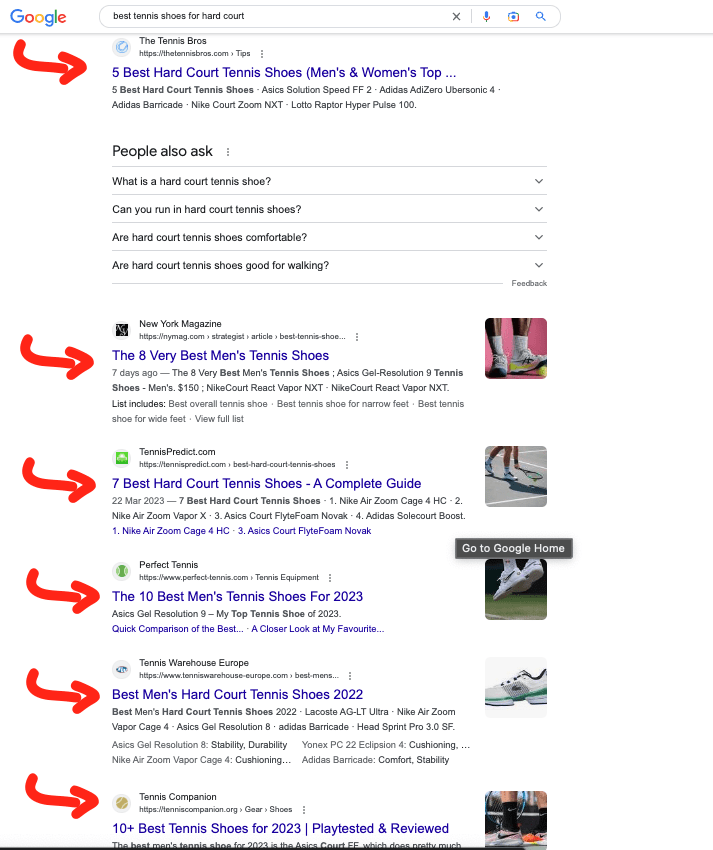
I know this is a tall task at first—but this is the name of the game.
At first, it can easily take a day or two to complete a single post. But once you get accustomed to the workflow, you’ll be much faster.
Write 5-10 blog posts about your niche. This will probably take 50+ hours if you do it the right way. But the whole point is to see if you really like blogging or not. It’s not everyone’s cup of tea, for sure!
In case you’re wondering, typically, your blog posts need to be at least 2,000 words in length.
But for example, in my case, my top 5 articles are all 5,000+ words in length—some even 10,000+ words!
I’ve written a separate guide on how to write blog posts that rank high. Make sure to check it out before you start to write content.
#3 Publish
I recommend publishing your very first article as soon as possible. Once you’ve finished your first-ever blog post, make sure to get it out there quickly.
Just make sure the post is useful—don’t worry about subtle details. There’s always something you could do better.
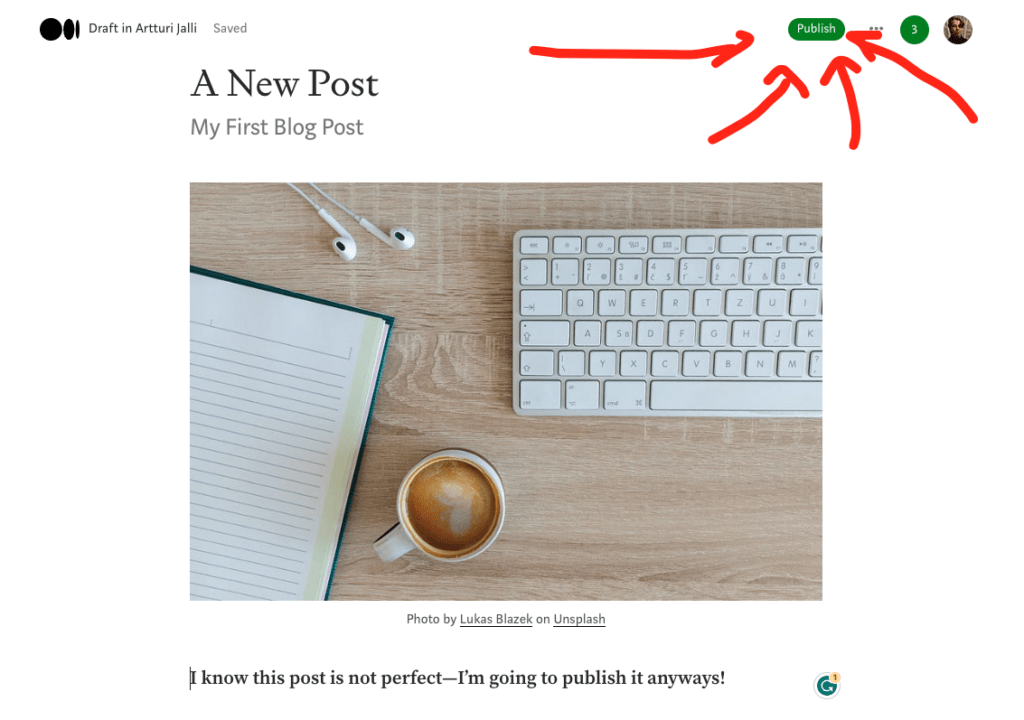
But the problem is you don’t have a blog to publish those on.
At this stage, there are two options:
- Start your own WordPress.org website (takes about 30-60 minutes).
- Start on a platform like Medium.com (takes literally 2 minutes).
A platform like Medium is super easy to get started with. There’s a built-in audience and it’s super easy to get started. Just remember that you’re not the captain of the ship if you blog on a platform like that.
I recommend building your own site straight away though. This way you start building your own audience right off the bat.
Don’t worry, you don’t need coding skills to start a site. I have written a complete guide about starting a blog. There’s a step-by-step guide on how to launch a website.
Once you have set up your blogging site, you can start publishing blog posts there. Make sure to install some analytics services on the site as well to track visitors.
Read also: Medium.com vs Own Blog.
Example Sites
Here are some example websites and their niches.
I’ve built these sites and I know exactly how they got off the ground and will share some insight.
1. codingem.com
Niche: Software development and reviews
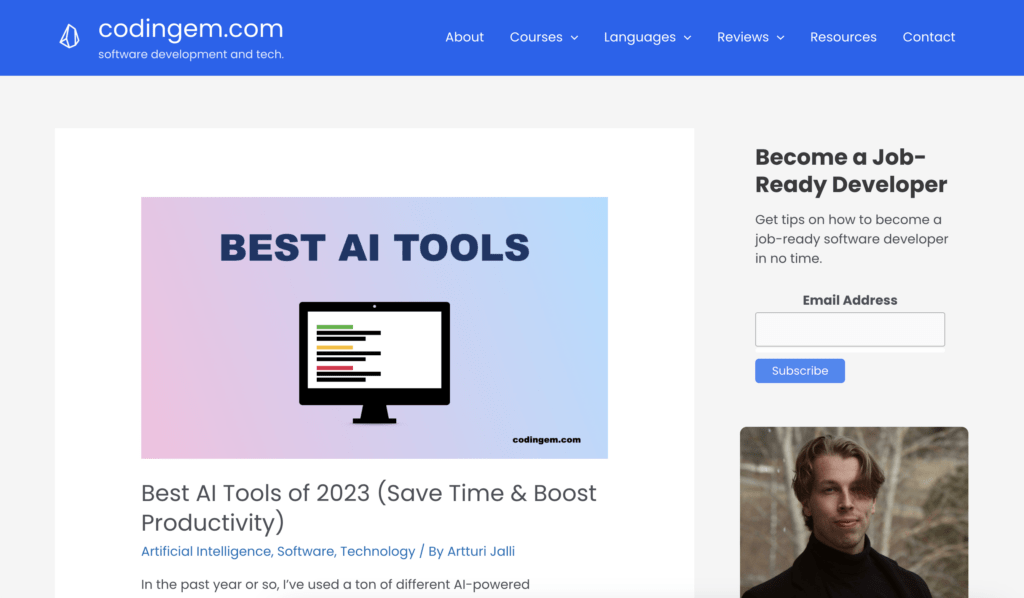
This is my own website that has more than 450 blog posts. It peaked at 890,000 monthly visitors and averaged over 300,000 monthly visitors for the past year.
The initial niche of this website was Python for beginners. After writing 100+ Python posts, the site was ranking nicely and I chose to niche up! Instead of writing about Python, I’ve been writing about software development in general.
Also, I write some software reviews (affiliate marketing).
To take home, this blog started as a small niche site in Python for beginners. However, as search engines started to trust the site, I broadened the niche to other coding languages and software reviews.
2. bloggersgoto.com
Niche: Blogging

The site you’re reading about right now is my second website project. The main goal of this site is to teach how to do blogging the right way.
Blogging is a super broad and competitive niche. Ranking high for blogging-related content is tough—there are tons of competitors.
But thanks to careful research and my expertise in blogging, this site already has a nice number of visitors (about 10,000-20,000 a month).
I started this site by writing about blogging productivity tools as well as writing on Medium.com. Those are both subcategories in the blogging space and are easier to rank high for.
3. parhaatmokit.fi
Niche: Rental Cottages for Domestic Trips
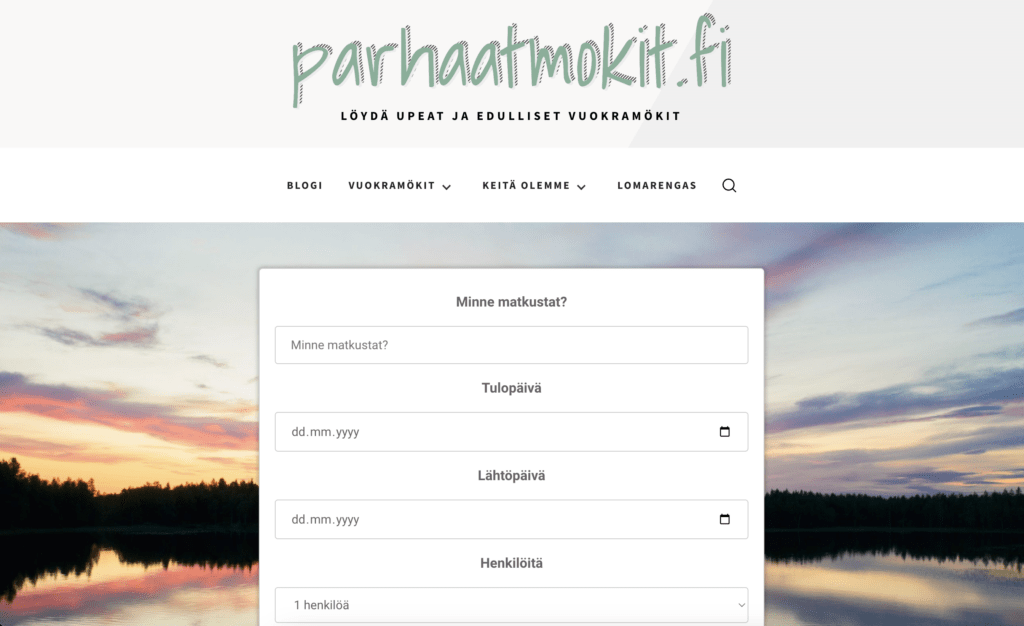
This is my niche site. I’m operating it with my friend. The site is in the cottage rental industry in Finland.
The site gets about 7,000 visitors per month.
Talking about a narrow niche! We’re restricted to a country where only 0.1% of the world’s population lives in. Also, we’re not a holiday accommodation site, but we only do cottages.
Yet it has still taken more than a year to get closer to that 10,000 page views a month. This is because the accommodation and holiday is so competitive niche—even in smaller countries like Finland.
Wrap Up
To find success as a blogger, you need two things:
- Find an in-demand niche
- High-quality blog posts to solve problems for people in that niche
I recommend checking my Free Blogging Masterclass. In this masterclass, you will learn how to start a successful blogging business.
